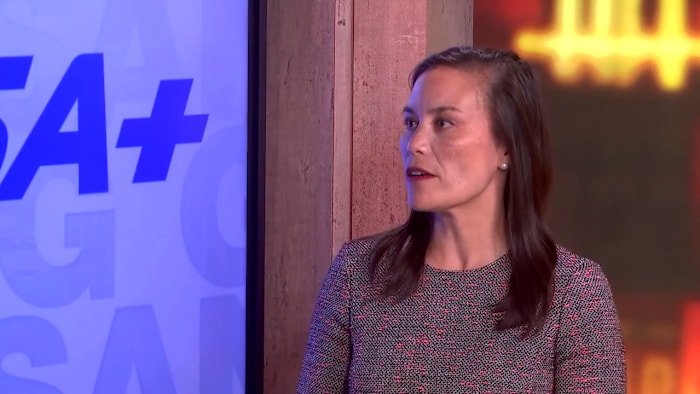SAN ANTONIO – San Antonio’s new mayor and city council are butting heads in an early power struggle.
The city council is scheduled to discuss the process for “council consideration requests,” or CCRs, on Wednesday afternoon, which will be its eighth meeting since the final members were sworn in on June 18.
A trio of council members bypassed Mayor Gina Ortiz Jones to force the meeting after they say she improperly inserted hurdles into one of the primary ways for council members to start official policy discussions.
The mayor says she’s trying to make the process more efficient and minimize legal risk, but opponents are concerned about council members losing power.
Professor Jon Taylor, the chairman of UTSA’s Department of Political Science and Geography, says it’s “worrisome” to have this kind of clash so early.
“If you continue to engage in this kind of stuff, it’s not gonna be productive,” Taylor said. “It’s going to end up creating — and it’s gonna alienate the mayor with members of the city council. And I’m fearful that it’s going to diminish (Jones’) ability to actually implement the policies and the ideas that she wants to implement and to serve the greater good of San Antonio.”
‘Concerns about centralized control’
Council members who want to propose a new ordinance or resolution can submit a CCR to prompt city staff to look into the issue — as long as four other council members sign on, too.
Issues like the city’s horse carriage ban and updated semi-truck parking restrictions started out as CCRs.
But the process was previously known for how long it could drag on, and council members passed an ordinance in March 2024 to help move their requests through more quickly.
Jones sent council members a July 14 memo outlining what she called “CCR Process Efficiencies.” Those included coordinating with her chief of staff while a CCR is being developed, requiring the city attorney’s office to perform an initial legal screening of the request, and requiring a signature from the city manager before a council member could begin gathering the necessary supporting signatures.
The 2024 ordinance requires council members to notify the city manager’s office of a proposed action for the identification of any pertinent city actions or programs. It does not explicitly mention a legal review until the proposal reaches the council’s Governance Committee.
Councilwoman Teri Castillo (D5), Councilwoman Marina Alderete Gavito (D7) and Councilman Marc Whyte (D10) quickly sent Jones a memo on July 16 saying she should make changes “through the proper channels just as the 2023 City Council did” and asked her to schedule a council meeting to discuss it.
On July 31, the same council members submitted a three-signature memo, a relatively rare maneuver that allows them to call for a meeting without the mayor’s input, after they said “no effort had been made to discuss and work through the proposed changes with the full council.”
The trio painted their complaint as “ensuring every district retains a voice in shaping City policy.”
“Proper vetting already occurs during the Governance Committee process, where CCRs are evaluated, discussed, and – when warranted – advanced,“ they said in a joint news release. ”Placing new restrictions at the front end undermines that structure and raises concerns about centralized control.”
Council members were originally scheduled to discuss the CCR process on Aug. 8, but the meeting was cancelled.
On the same day, Jones sent council members another memo, which largely doubled down on her previous message, declaring council “will use the revised process for the next six months to determine if further enhancements to the process are needed.”
Jones said the CCR template explicitly asked the sponsor to confirm the city manager had been notified, but “adherence to this basic practice was inconsistent,” and that an initial legal review was needed because “changes in our judicial environment necessitate we do not needlessly expose our community to legal risks.”
However, the mayor clarified that coordinating with her chief of staff was meant to be a simple notification, and not an additional level of review, and removed it from her list of “prerequisites.”
Jones also wrote that CCRs that were not “actioned” during the previous council term would need to be resubmitted for consideration “out of respect for newly elected members of City Council and in accordance with other major legislative bodies.”
Ten of the 12 CCRs now listed as “expired” on the city website were authored or co-authored by Castillo, Alderete Gavito and Whyte.
The other two were filed by former District 8 Councilman Manny Pelaez, who suggested renaming the airport after former Spurs Coach Gregg Popovich, and District 2 Councilman Jalen McKee-Rodriguez, who asked to rename a portion of Iowa Street as “Tuskegee Airmen Way.”
Asserting authority
Jones wrote in her Aug. 8 memo that City Attorney Andy Segovia had said her “enhancements” did not require changing city ordinance.
Taylor also thinks Jones has the power to make the changes, but thinks by trying to assert her authority, “you alienate people who could be your natural allies.”
“I have the powers of department chair and an associate dean to do certain things. Am I going to always do it? No, because you have to read the room,” Taylor said. “To me, she’s not reading the room well enough right now.”
He also pointed to the existing vetting process as a reason her directives could be redundant.
“My argument is, ‘why worry about that?’ Let ‘em go forward. If it’s valid, if it’s something that actually is supported by other members, you know, you vote on it, and all of a sudden, we consider it. Otherwise, it doesn’t get considered,” Taylor said.
Read more:
Copyright 2025 by KSAT – All rights reserved.
